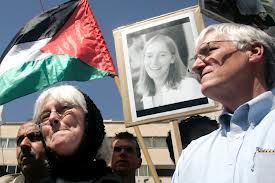Tag: Video
-
Justice for Rachel Corrie
Cindy and Craig Corrie talk about their struggle for accountability for Rachel’s death Abby Martin speaks with Cindy and Craig Corrie, parents of slain activist Rachel Corrie, about their case against the Israeli government and their fight for social justice worldwide through the Rachel Corrie Foundation.
-
Hebron man walks down street for first time in years
By Ben 10 September 2012 | International Solidarity Movement, West Bank On Sunday 9th September, Hashem Azzeh walked down the street outside his house for the first time in years. Hashem lives with his artist wife Nasreen and their four children (14, 9, 4 and 2 years old) on a hillside in the Tel Rumeida…
-
Gaza activists: #RememberRachel and support #BDS
Palestinians in Gaza support the Corrie family on the eve of the verdict in their lawsuit against Israel over its 2003 killing of their daughter Rachel, as well as divestment from Caterpillar and the global Boycott, Divestment, and Sanctions (BDS) movement.

